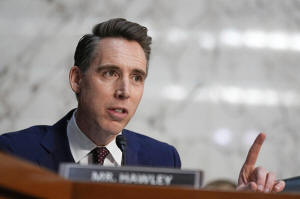The GOP's big bill would bring changes to Medicaid for millions
[June 16, 2025]
By LEAH ASKARINAM
WASHINGTON (AP) —
Republican Sen. Josh Hawley has been clear about his red line as the
Senate takes up the GOP’s One Big Beautiful Bill Act: no Medicaid cuts.
But what, exactly, would be a cut?
Hawley and other Republicans acknowledge that the main cost-saving
provision in the bill – new work requirements on able-bodied adults who
receive health care through the Medicaid program -- would cause millions
of people to lose their coverage. All told, estimates are 10.9 million
fewer people would have health coverage under the bill’s proposed
changes to Medicaid and the Affordable Care Act. That includes some 8
million fewer in the Medicaid program, including 5.2 million dropping
off because of the new eligibility requirements.
“I know that will reduce the number of people on Medicaid,” Hawley told
a small scrum of reporters in the hallways at the Capitol.
“But I’m for that because I want people who are able bodied but not
working to work.”
Hawley and other Republicans are walking a politically fine line on how
to reduce federal spending on Medicaid while also promising to protect a
program that serves some 80 million Americans and is popular with the
public.
As the party pushes ahead on President Donald Trump’ s priority package,
Republicans insist they are not cutting the vital safety net program but
simply rooting out what they call waste, fraud and abuse. Whether that
argument lands with voters could go a long way toward determining
whether Trump's bill ultimately ends up boosting — or dragging down —
Republicans as they campaign for reelection next year.

Republicans say that it’s wrong to call the reductions in health care
coverage “cuts.” Instead, they’ve characterized the changes as rules
that would purge people who are taking advantage of the system and
protect it for the most vulnerable who need it most.
What’s in the bill
House Republicans wrote the bill with instructions to find $880 billion
in cuts from programs under the purview of the Energy and Commerce
Committee, which has a sprawling jurisdiction that includes Medicaid.
In the version of the bill that the House passed on a party-line vote
last month, the overall cuts ended up exceeding that number. The Kaiser
Family Foundation projects that the bill will result in a $793 billion
reduction in spending on Medicaid.
Additionally, the House Ways & Means Committee, which handles federal
tax policy, imposed a freeze on a health care provider tax that many
states impose. Critics say the tax improperly boosts federal Medicaid
payments to the states, but supporters like Hawley say it’s important
funding for rural hospitals.
“What we’re doing here is an important and, frankly, heroic thing to
preserve the program so that it doesn’t become insolvent,” Speaker Mike
Johnson said on NBC's “Meet the Press.”
House Democratic leader Hakeem Jeffries, meanwhile, has denounced the
bill as an “assault on the healthcare of the American people” and warned
years of progress in reducing the number of uninsured people is at risk.
Who would lose health coverage
The nonpartisan Congressional Budget Office estimates that the GOP's
proposed changes to federal health programs would result in 10.9 million
fewer people having health care coverage.
Nearly 8 million fewer people would be enrolled in Medicaid by 2034
under the legislation, the CBO found, including 5.2 million people who
would lose coverage due to the proposed work requirements. It said 1.4
million immigrants without legal status would lose coverage in state
programs.

[to top of second column]
|

Sen. Josh Hawley, R-Mo., speaks during a confirmation hearing at the
Capitol in Washington, Jan. 15, 2025. (AP Photo/Ben Curtis, File)

The new Medicaid requirements would apply to nondisabled adults
under age 65 who are not caretakers or parents, with some
exceptions. The bill passed by the U.S. House stipulates that those
eligible would need to work, take classes, or record community
service for 80 hours per month.
The Kaiser Family Foundation notes that more than 90% of people
enrolled in Medicaid already meet those criteria.
The legislation also penalizes states that fund health insurance for
immigrants who have not confirmed their immigration status, and the
CBO expects that those states will stop funding Medicaid for those
immigrants altogether.
Why Republicans want Medicaid changes
Republicans have cited what they call the out-of-control spending in
federal programs to explain their rationale for the changes proposed
in the legislation.
“What we are trying to do in the One Big Beautiful Bill is ensuring
that limited resources are protected for pregnant women, for
children, for seniors, for individuals with disabilities,” said Rep.
Erin Houchin, R-Ind., in a speech on the House floor.
Senate Majority Whip John Barrasso argued that Medicaid recipients
who are not working spend their time watching television and playing
video games rather than looking for employment.
Republicans also criticize the CBO itself, the congressional
scorekeeper, questioning whether its projections are accurate.
The CBO score for decades has been providing non-partisan analysis
of legislation and budgetary matters. Its staff is prohibited from
making political contributions and is currently led by a former
economic adviser for the George W. Bush administration.
What polling shows
While Republicans argue that their signature legislation delivers on
Trump’s 2024 campaign promises, health care isn’t one of the
president’s strongest issues with Americans.
Most U.S. adults, 56%, disapproved of how Trump was handling health
care policy in CNN polling from March. And according to AP VoteCast,
about 6 in 10 voters in the November election said they wanted the
government “more involved” in ensuring that Americans have health
care coverage. Only about 2 in 10 wanted the government less
involved in this, and about 2 in 10 said its involvement was about
right.

Half of American adults said they expected the Trump
administration’s policies to increase their family’s health care
costs, according to a May poll from KFF, and about 6 in 10 believed
those policies would weaken Medicaid. If the federal government
significantly reduced Medicaid spending, about 7 in 10 adults said
they worried it would negatively impact nursing homes, hospitals,
and other health care providers in their community.
For Hawley, the “bottom lines” are omitting provisions that could
cause rural hospitals to close and hardworking citizens to lose
their benefits.
He and other Republicans are especially concerned about the freeze
on the providers’ tax in the House’s legislation that they warn
could hurt rural hospitals.
“Medicaid benefits for people who are working or who are otherwise
qualified,” Hawley said. “I do not want to see them cut.”
All contents © copyright 2025 Associated Press. All rights reserved |